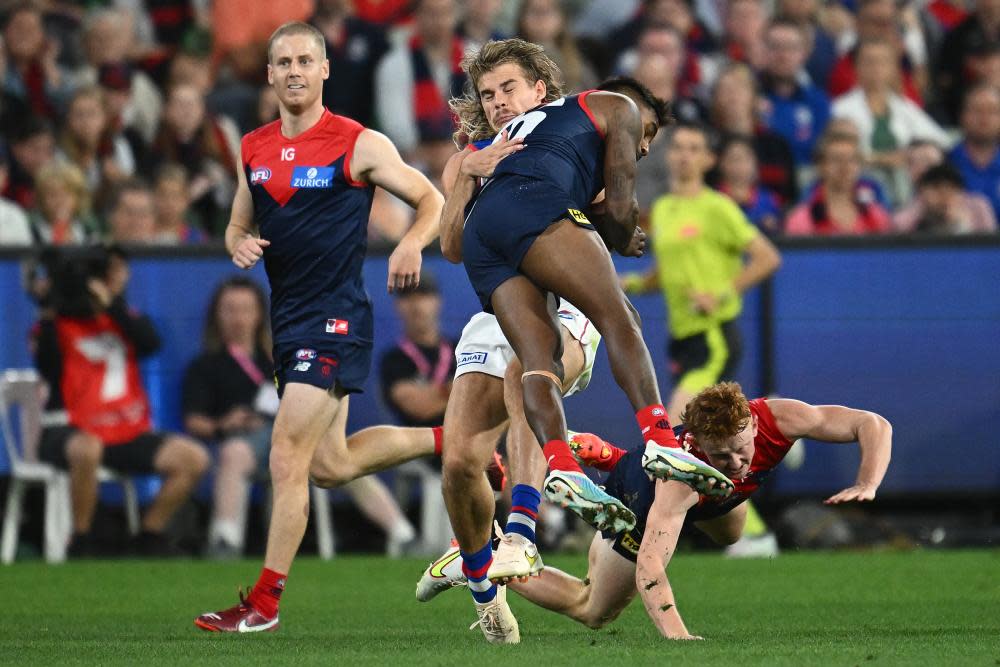Concussion experts call for tougher AFL penalties after Kysaiah Pickett’s high bump

Leading concussion experts have called for stiffer sanctions to be meted out to AFL players who carry out dangerous hits, arguing Melbourne’s Kysaiah Pickett should have been banned for at least four matches instead of the two he received for his bump on Western Bulldog Bailey Smith.
The opening weekend of the 2023 season was marred by high hits, with Sydney’s Lance Franklin handed a one-match suspension for his bump on Gold Coast’s Sam Collins and Adelaide’s Shane McAdam to learn of his own fate on Monday for his bump on Greater Western Sydney’s Jacob Wehr.
Related: Concussion dominates headlines as NRL and AFL seasons get under way | Stephanie Convery
But it was the Pickett incident – and match review outcome – which has caused the most controversy. The forward floored Smith from the air on Saturday night and, while Smith was quickly back on his feet and played on, match review officer Michael Christian graded the hit as high impact through the “potential to cause serious injury” clause.
It was a departure from normal protocol, in that bumps which do not cause serious injury are generally graded as low or medium and result in a one-match ban. However, even the higher two-match ban has been described as too lenient, with former player Jude Bolton calling it “inadequate for the action”.
Originally thought Kosi Pickett would get a minimum of 3 weeks.
Understand they take the outcome into consideration, but 2 weeks seems inadequate for the action.#AFL pic.twitter.com/enilYFlmVP— Jude Bolton (@Jude_Bolton) March 19, 2023
Dr Alan Pearce, a neuroscientist and concussion researcher, contended that Smith’s brain – despite not displaying signs of a clinical concussion – would still have been shaken by the force to such an extent it was akin to having been “in a car accident”.
“It’s quite disappointing when the AFL are espousing this rhetoric around player health and wellbeing being their highest priority, yet the penalties given seem to be more based on whether the player was hurt or not,” Pearce said.
“If you wanted to really deter intentional bumping that really could hurt someone and, more importantly, could cause brain damage, it should be a month. While Bailey Smith and Kysaiah Pickett weren’t concussed, per se, we know from the science that that’s a clear incident that contributes to CTE.
“If you look at both of the players’ heads, the way they sort of move forward and backwards with such violence, that’s acceleration and deceleration force on the brain tissue. That’s like being in a car accident, when you see the head go like that.”
Collingwood veteran Scott Pendlebury urged the AFL to punish players based on the action rather than the outcome.
“We still live in the outcome, punishing the outcome,” Pendlebury said. “Rightly or wrongly, I don’t agree with that. I think it should be the action that gets punished. They’re not football actions.”
The long-term ramifications of brain injuries to participants of contact sports is in the Australian consciousness more than ever before, with the AFL facing at least one concussion class action and another potentially on the way, and the NRL introducing a mandatory 11-day stand-down period.
"This is as vicious an incident as you're going to see for a long time."
The panel reacts to Kysaiah Pickett's bump on Bailey Smith. #9AFLSFS | @Channel9 pic.twitter.com/8KrChFA32g— Footy on Nine (@FootyonNine) March 18, 2023
Dr Rowena Mobbs, a neurologist at Macquarie University, said the AFL must review its policy around sanctions for dangerous bumps.
“Whether it was intentional by Pickett or not, the AFL now needs to urgently consider whether such head impacts are avoidable in structured play and whether they deserve a tougher penalty,” Mobbs said.
“This type of impact in another player may have been enough to cause a brain bleed, and although Smith appeared fine, the next month will be telling for delayed concussion symptoms.”
It comes three weeks after the NRL, Rugby Australia and Football Australia acknowledged the link between head trauma sustained on the field and the serious neurodegenerative disease, chronic traumatic encephalopathy (CTE), at an Australian Senate inquiry. The AFL has yet to face the Senate committee.
Last month the inquiry also heard that the sport industry’s treatment of concussion is like the tobacco industry’s defence of smoking, and the legal system is “stacked against players” seeking redress for their injuries.

 Yahoo News
Yahoo News 
